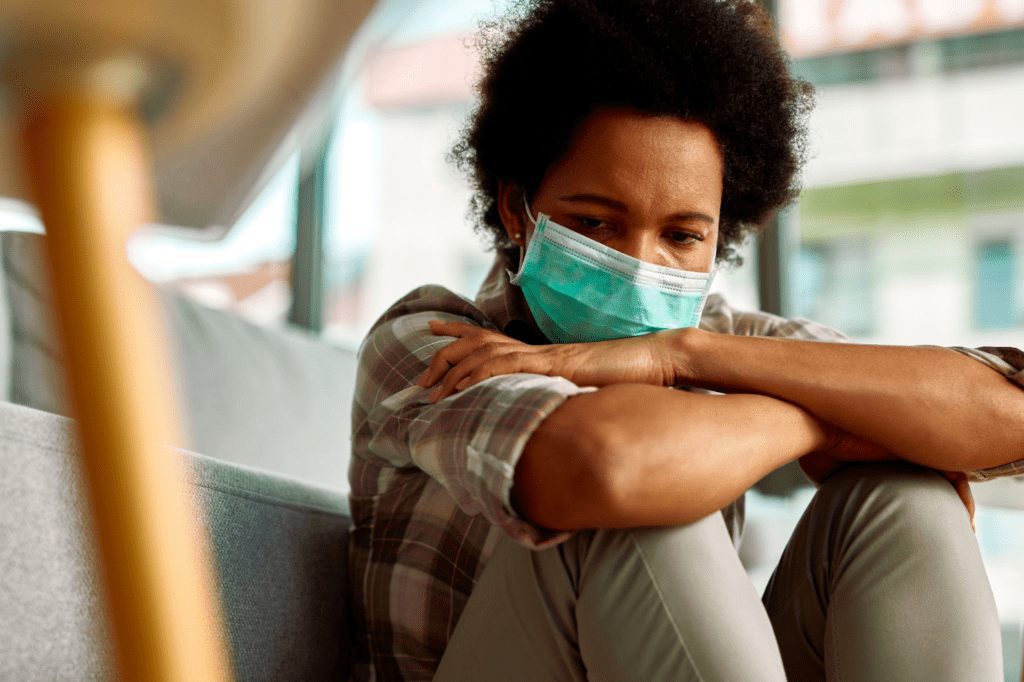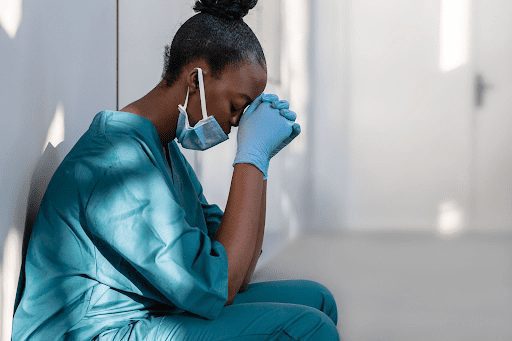COVID-19 remains a serious threat, despite a vaccine now being widely available in many countries across the globe. Its mental health effects on special populations and the general public have been particularly persistent, particularly when it comes to major depressive disorder (MDD). Under and following COVID, depression statistics have and are continuing to be affected by the global pandemic. Read on to find out how.

The incredible instability and uncertainty that the coronavirus introduced to the world have had an array of ramifications: a mounting death toll, immediate health risks, economic hardships, repeated periods of extended social distance and isolation, and national lockdowns have all resulted from the pandemic, affecting individuals and entire populations. Together with the below concrete results, the mental health effects of COVID-19 have also had widespread repercussions.
More than half of respondents from the general US population admitted that the pandemic has taken a serious toll on their mental health, particularly through the introduction of major stressors and the sadness that eventually morphs into depression. Over 42% reported experiencing either anxiety or depression under the coronavirus outbreak during 2020—a 200% increase from 2019.
The long-term periods of isolation experienced under COVID also increase the chances of developing anxiety or post-traumatic stress disorder (PTSD). Both of these mental health disorder families, incidentally, have been found to be associated with depression.
Desperation is another one of the concerns mental health experts are citing in a post-COVID reality. Continually facing health and financial threats, for instance, can create a sense of hopelessness, loneliness, energy depletion, and suicidal ideation.
Obsessive-compulsive disorder (OCD), and particularly cleanliness-focused OCD, is being triggered by the pandemic threat of infection through casual contact. Already fearing infection and spending an inordinate amount of time and effort on sterilizing their environment, many patients who had already been facing cleanliness OCD have experienced an increased sense of panic, over the possibility of contracting COVID.
During the second wave of the pandemic—but not during the first wave—a significant spike in depressive symptoms was recorded, both in the general population and among those who had been battling depression before the coronavirus outbreak. The fact that COVID-related depression became noticeable after a resurgence of cases suggests that it may have been the result of gradual fatigue, as well as repeated spurts of worrying over matters of health, safety, and stability.
The coronavirus pandemic brought with it many different stressors, triggering various depressive symptoms. But while each individual has experienced the threat of COVID-19 through their own set of circumstances, it is the loneliness stemming from isolation that seems to be the most direct link between the pandemic and rising rates of depressive symptoms.
Remaining alone with one’s thoughts and feelings, during a period of heightened stress and dread from the uncertainty of the future, can bring on symptoms of depression. The resulting loneliness has also been shown to weaken one’s immune system, worsening symptoms of dementia, and making it harder to manage their own stress levels.
The prospect of a post-pandemic world raises the issue of the general population’s already heightened levels of depression under COVID.
The resulting trend of rising depression rates (as well as anxiety) are expected to continue to remain high following the pandemic. Mental health symptoms do not usually pass the instant their source is eliminated, as is seen in a recent academic paper that found that US residents generally cite no improvement in the prevalence of their depression, with 28% reporting a level of severity that typically requires professional support.
Reflecting this is a recent mental health report coming out of the UK, stating that one in five UK adults have reported experiencing depressive symptoms over the pandemic period.
Somewhat conversely, another recent UK report has found that the number of official major depression diagnoses has dropped by 23.7%. Experts say the disparity between rising depressive symptoms and a decrease between depression diagnoses is due to individuals not having the necessary access to mental health professionals who can diagnose and properly treat them.
Another concerning report finds that between a third and half of those who have recovered from COVID later develop depression. The reason behind this seems to be a combination of experiencing significant, prolonged stress during the pandemic, with severe disruption to their social and support networks. The same report also states that individuals who develop depression following a COVID diagnosis can continue to experience them for months after their coronavirus recovery.
Healthcare workers are a group found to be severely affected by the pandemic. Being exposed to large numbers of traumatic cases can become overwhelming, with more than half of healthcare workers later developing symptoms of depression, as well as anxiety or stress. These statistics are expected to continue into the future.

One significant aspect expected to temper the rise in depression cases is the global economy’s gradual recovery, as studies have linked individuals’ sense of financial stability to their overall well-being.
According research, during recessions the rising rates of suicide mirror the rising rates of unemployment. On the flip side of this grim statistic, now that more individuals are being vaccinated, economies are receiving a boost, as a growing number of them are rejoining the workforce.
Overall, this means that improved financial status can help improve one’s quality of life, and as a result, help sustain them against symptoms of depression.
Wishing to assist individuals around the world contending with the adverse effects of depression, anxiety, and other mental health issues stemming from COVID-19, the WHO has compiled a mental health guide to help work through emotional stressors.
The WHO’s guidebook offers different forms of mindfulness, introspection, and perception, in an effort to reflect on the hardships involved in their daily lives, which can be implemented in cases of COVID-related depression: has their financial situation worsened following the pandemic? Do they notice more worrying thoughts regarding their personal health and that of their loved ones? What emotions do they experience more frequently now, compared to earlier periods in their lives?
As individuals begin to develop their ability to examine their mental state, identify their thoughts and emotions, and ground themselves within the present moment through focusing on their sensory experiences, they are hopefully able to give new proportions to feelings that typically would overwhelm them.